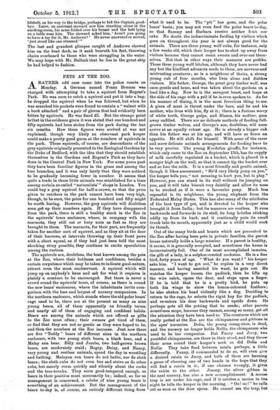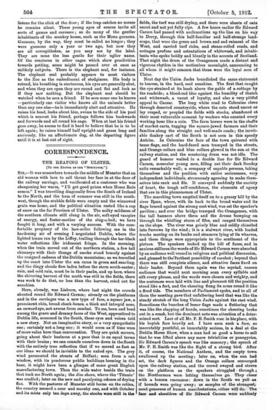PETS AT THE ZOO.
ARATHER odd case came into the police courts on Monday. A German named Franz Brumm was charged with attempting to take a squirrel from Regent's Park. He was seen to catch a squirrel and put it into a bag; he dropped the squirrel when he was followed, but when he was searched his pockets were found to contain a " walnut with a hook attached " and a pair of gloves that had evidently been bitten by squirrels. He was fined £5. But the strange point is that in the evidence given it was stated that one hundred and fifty squirrels had been stolen from the park during the last six months. How these figures were arrived at was not explained, though very likely an observant park keeper could make a pretty good guess at the numbers of squirrels in the park. These squirrels, of course, are descendants of the grey squirrels originally presented to the Zoological Gardens by the Duke of Bedford, with the idea that they should establish themselves in the Gardens and Regent's Park as they have done in the Central Park in New York. For same years past they have been familiar figures in the grass and among the tree branches, and it was only lately that they were noticed to be gradually becoming fewer in number. It seems that quite a trade in these little animals was established for a time among certain so-called " naturalists' " shops in London. You could buy a grey squirrel for half-a-crown, so that the price given to catchers in the park cannot have been very high, though, to be sure, the price for one hundred and fifty might be worth having. However, the grey squirrels will doubtless soon get up their numbers again. If they have disappeared from the park, there is still a healthy stock in the Zoo in the squirrels' trees enclosure, where, in company with the marmots, they still eat or bury nuts as fast as they are brought to them. The marmots, for their part, are frequently taken for another sort of squirrel, and as they sit at the door of their burrows, at intervals throwing up their front paws with a short squeal, as if they had just been told the most shocking story possible, they continue to excite speculation among the curious.
The squirrels are, doubtless, the best known among the pets at the Zoo, where their boldness and confidence, besides a certain corpulence which may be taken to indicate good-nature. attract even the most unobservant. A squirrel which will jump up on anybody's knee and ask for what it requires is plainly a creature to be encouraged. But there is never a crowd round the squirrels' trees, of course, as there is round the new bears enclosures, where the inhabitants invite com- parison with the best and largest of nursery companions. In the northern enclosure, which stands where the old polar bears' cage used to be, there are at the present as many as nine young bears, all of them apparently on friendly terms, and nearly all of them of engaging and confident habits. Bears are among the animals which are offered as gifts to the Zoo most often ; their owners get tired of them, or find that they are not so gentle as they were hoped to be, and then the numbers at the Zoo increase. Just now there are five " Teddy " bears of different sizes in the northern enclosure, with two young sloth bears, a black bear, and a Malay sun bear. Billy and Jumbo, two half-grown brown bears, are moderately staid ; Bogey, Daisy, and Nancy, very young and restless animals, spend the day in wrestling and bathing. Malayan sun bears do not bathe, nor do sloth bears ; the sloth cubs do not even box and strive as do other cubs, but merely roam quickly and silently about the rocks and the tree-trunks. They seem good-tempered enough, as bears in their position must necessarily be ; indeed, so far as management is _concerned, a creche _of nine young bears is something of- an achievement. But the management of the bears to-day is, of course, an entirely different thing from what it used to be. The "pit " has gone, and the polar bears' basin; you may not even feed the polar bears to-day, so that Sammy and Barbara receive neither fruit nor cake. No doubt the indiscriminate feeding by visitors which goes on throughout the year is not always good for the animals. There are three young wolf cubs, for instance, only a few weeks old, which their keeper has to shut up away from visitors because they cannot resist sweets and over-eat them- selves. Not that in other ways their manners are petlike. These three young wolf bitches, although they have never had any but the kindliest advances made to them, are nervous and mistrusting creatures ; so is a neighbour of theirs, a strong young cub of four months, who lives alone and dislikes visitors. His father, George, the great grey timber wolf, was once gentle and tame, and was taken about the gardens on a lead like a dog. Now he is the savagest beast, and leaps at the side of his cage with a yell if he is even spoken to. As for his manner of dining, it is the most ferocious thing to see. A piece of meat is thrust under the bars, and he and his mother, who lives with him, fly at it; there is a furious worry of white teeth, George gulps, and Blanca, his mother, goes away unfilled. There are no delicate methods of feeding full- grown timber wolves, and George's son, doubtless, will soon arrive at an equally robust age. He is already a bigger cub than his father was at his age, and will have as fierce an appetite. He will shift for himself. With some of the rarer and more delicate animals arrangements for feeding have to be very precise. The young Kordofan giraffe, for instance, which only came to the Zoo on September 13th, has its supply of milk carefully regulated in a bucket, which is placed in a manger high on the wall, so that it cannot tip the bucket over and so lose the milk. It is a most friendly and gentle animal, though it likes amusement ; "He'd very likely jump on you," the keeper tells you, " not meaning to hurt you, but in play." However, you can stand in its stall without its jumping on you, and it will take biscuit very daintily and allow its nose to be stroked as if it were a favourite pony. Much less reposeful is its neighbour, the young elephant from the Federated Malay States. This has also many of the attributes of the best type of pet, and is devoted to the keeper who brought it from India ; but its manners are restless. It runs backwards and forwards in its stall, its long bristles sticking oddly up from its back, and it continually puts its small trunk into its mouth, apparently just as a child would suck its thumb.
Out of the many birds and beasts which are presented to the Zoo after having been pets in private families, the parrot house naturally holds a large number. If a parrot is healthy, it seems, it is generally accepted, and sometimes the house is inconveniently full. One of its most accomplished inmates, the gift of a lady, is a sulphur-crested cockatoo. He is a fine bird, forty years of age. " What do you want P " his keeper asks him. "I want to get out," he replies in a very direct manner, and having asserted his want, he gets out. He watches the keeper loosen the padlock, then he lifts up the wire catch, opens the door, and steps upon a finger. If he is told that he is a pretty bird, he puts up both his wings to show the lemon-coloured feathers ; he also shakes his head violently like a dog. Deciding to return to the cage, he selects the right key for the padlock, and re-enters his door backwards and upside down. lie perhaps gets all the petting that he needs ; other parrots sometimes mope, because they cannot, among so many, get. all the attention they have been used to. The creatures which are really petted at the Zoo are the chimpanzees and gibbons in the apes' nurseries. Delia, the young orang-utan, is dead, and the nursery no longer holds Nellie, the chimpanzee who used to be her companion. But Fanny and Jerry, two youthful chimpanzees, are there in their stead, and they throw their arms round their keeper's neck as did Delia and Nellie. They take food between meals, perhaps, a little differently. Fanny, if commanded to do so, will even give a desired raisin to Jerry, and both of them are learning a game of choosing one of two hands in the hope that they will find a raisin in it; if one chooses wrongly, it gives the raisin to the other. Jimmy, the silver gibbon in the next nursery, has also a new accomplishment. A mouse trap is set under his cage, and if it catches a mouse in the night he tells the keeper in the morning. " Oo! oo !" he calls out as Soon as the door opens. -He cannot see the trap, but
listens for the click of the door ; if the trap catches no mouse be remains silent. These young apes of course invite all sorts of games and caresses ; so do many of the gentler inhabitants of the monkey house, such as the Mona guenons. Guenons, by the way, they must be called no longer ; they were guenons only a year or two ago, but now they are all cercopithekes, as you may see by the label. They are none the less gentle for their uglier name. Of the creatures in other cages which show proclivities towards petting, some might be passed over at once as unlikely subjects. There is the elephant seal, for instance. The elephant seal probably appears to most visitors to the Zoo as the embodiment of stodginess. His body is rotund, his breathing is stertorous, his eyes are generally shut, and when they are open they are round and fiat and look as if they saw nothing. But the elephant seal should be watched when he sees a friend. If he sees some one be knows —particularly one visitor who knows all the animals better than any one else—he is immediately alert and attentive. He raises his bead, looks about him, swims to the side of his pool which is nearest his friend, perhaps follows him backwards and forwards and all round his cage. When at last his friend goes away, he seems to find it hard to believe that he is to be left again ; he raises himself half upright and gazes long and anxiously, like an affectionate dog, at the departing figure until it is at last out of sight.



































































 Previous page
Previous page